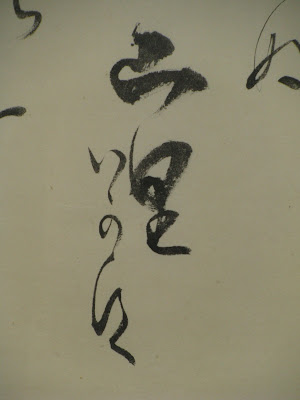


Kobara Ranseki Sensei was the founder of Ranseki Sho Juku Japanese calligraphy. He was, with over 50 years of training, widely regarded as one of the preeminent masters of shodo brush calligraphy in the world.
The images above, from the collection of Hiseki Davey, are an example of Mr. Kobara's kana style calligraphy. Kana are the phonetic symbols of Japan, and they are typically brushed in a flowing and cursive script. In the artwork above, Kobara Sensei included some sosho kanji, Chinese characters painted in an abstracted and cursive form, a script that flows into the equally gentle and rounded kana. (Left click with your mouse on the above images to zoom in.)
The calligraphy was painted on a large piece of handmade Japanese washi paper, which tends to resist the absorption of ink, and which gives the kana and kanji a unique textured appearance. The poem itself reads:
If the voice of the nightingale
Did not sound
How could I know
That spring has come
To this mountain village of unmelted snow.
Nakatsukasa
Wakan Roei Shu
Did not sound
How could I know
That spring has come
To this mountain village of unmelted snow.
Nakatsukasa
Wakan Roei Shu
